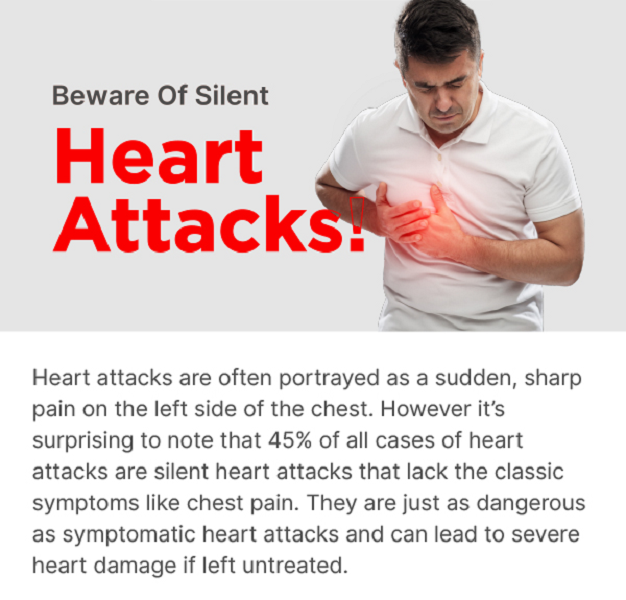Description: Discover the unusual signs of a silent heart attack in this informative guide. Learn to recognize these symptoms for early intervention and a healthier heart.
👇👇
Unusual Signs of a Silent Heart Attack
Have you ever wondered if you could be experiencing a silent heart attack without realizing it? It's not just the crushing chest pain and shortness of breath that can signal a heart problem. In this comprehensive guide, we will explore the unusual signs of a silent heart attack that often go unnoticed. Recognizing these symptoms can be the key to early intervention and a healthier heart.
Introduction
A heart attack is a life-threatening event that typically conjures images of intense chest pain and dramatic clutching of the chest. However, some heart attacks are subtler and manifest in ways that are not immediately recognizable. These are known as silent heart attacks. In this article, we will delve into the lesser-known, unusual signs of a silent heart attack and how recognizing them can make a significant difference.
Silent Heart Attack - What is it?
Before we dive into the unusual signs, let's understand what a silent heart attack is. A silent heart attack, medically known as a silent myocardial infarction (SMI), lacks the dramatic symptoms often associated with a regular heart attack. This stealthy condition can occur without the individual even realizing it. It's crucial to be aware of these unusual signs to ensure timely medical attention.
The Usual Suspects: Chest Pain and Shortness of Breath
While unusual signs can occur during a silent heart attack, it's important not to dismiss the classic symptoms:
- Chest Pain: While not unusual, it's still the most common symptom of a heart attack. If you experience chest pain, especially if it radiates to your arm, neck, or jaw, seek immediate medical attention.
- Shortness of Breath: Struggling to catch your breath can be a sign of a heart attack, even without chest pain.
UNUSUAL SIGNS OF A SILENT HEART ATTACK
👇👇
Now, let's explore the unusual signs that might signal a silent heart attack:
1. Profound Fatigue
One of the most overlooked signs of a silent heart attack is extreme fatigue that seems to come out of nowhere. You may find yourself feeling overwhelmingly tired, even after a full night's sleep. This unusual fatigue can persist for days or even weeks.
2. Flu-like Symptoms
Some individuals who experience a silent heart attack report symptoms resembling a common cold or the flu. These can include mild fever, coughing, and a general feeling of malaise.
3. Digestive Distress
Unexplained stomach discomfort or indigestion can be an indicator of a silent heart attack. It's often mistaken for heartburn, but if it persists and is accompanied by other symptoms, it's worth considering.
4. Jaw or Ear Pain
Pain in the jaw or ear, often on the left side, can be a sign of a silent heart attack. This pain may come and go or be persistent.
5. Excessive Sweating
Sudden, unexplained sweating can be alarming. If you break into a cold sweat for no apparent reason, it could be your body's way of signaling a silent heart attack.
6. Arm and Shoulder Pain
While not as intense as the classic radiating pain, some individuals experience mild discomfort in their arms or shoulders during a silent heart attack. This pain may not be constant but could occur in waves.
Frequently Asked Questions (FAQs)
Q: Can a silent heart attack be as severe as a regular heart attack?
A: Yes, a silent heart attack can be just as damaging to the heart as a typical heart attack. It's crucial to seek medical attention if you suspect one.
Q: Are silent heart attacks common?
A: Silent heart attacks are more common than you might think, and they often go undiagnosed.
Q: Can lifestyle changes prevent silent heart attacks?
A: Maintaining a healthy lifestyle, including a balanced diet, regular exercise, and stress management, can reduce the risk of silent heart attacks.
Q: How are silent heart attacks diagnosed?
A: Diagnosis often involves an electrocardiogram (ECG) or blood tests to check for cardiac enzymes.
Q: What should I do if I suspect a silent heart attack?
A: Seek immediate medical attention. Don't wait, as early intervention is crucial.
Q: Can silent heart attacks be fatal?
A: Yes, silent heart attacks can lead to severe complications and even be fatal if left untreated.
Conclusion
Silent heart attacks are stealthy, potentially dangerous events that can occur without the usual dramatic symptoms. Recognizing the unusual signs of a silent heart attack is crucial for early intervention and improved outcomes. If you or someone you know experiences these unusual symptoms, seek medical attention promptly. Your heart health is worth it.


